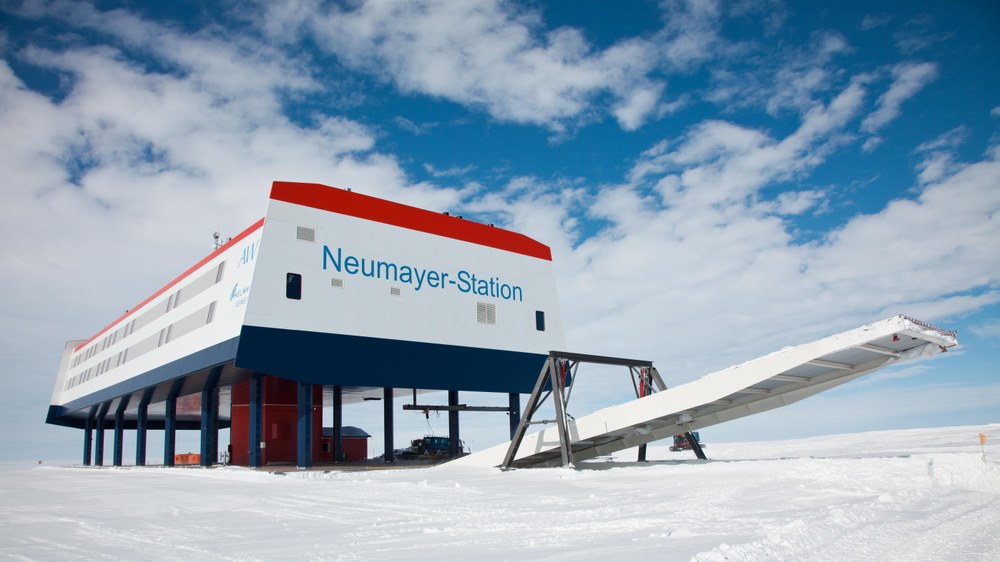Growing vegetables in the Antarctic

A workshop in Dutch greenhouses has brought Paul Zabel another step closer to his actual mission: starting December 2017, the German Aerospace Center (Deutsches Zentrum für Luft- und Raumfahrt; DLR) engineer will set off for the Antarctic, where he will spend one year living in a specially constructed container in Neumayer-Station III with the designated task of growing lettuce, cucumbers, herbs and tomatoes. In order to do this, he first had to learn how to care for plants and how they are harvested and measured. Scientists in the EDEN ISS project are attempting to approximate a long-term mission in space with the greatest possible accuracy: an isolated location, a small crew living together in a remote setting, and a provisioning system in which fresh fruit and vegetables would be very welcome additions to the menu. For this to happen, the engineer needs to become – at least temporarily – a farmer trudging 300 metres to his greenhouse container every day to cultivate food using artificial light and effective nutrient solutions – without soil.
To-do lists for the trip to the South Pole
The journey to his new workplace will be more cumbersome than his usual way to the DLR Institute of Space Systems in Bremen: the 28-year-old will first fly to Cape Town; from there, he will hop on board a Russian transport aircraft that will take him to a Russian Antarctic station. He will then travel to the Alfred Wegener Institute (AWI) station on board a smaller aircraft. The actual duration of the journey will depend heavily on the weather. The DLR engineer is already thinking carefully about what he wants to take along for the trip. "From time to time, I really do scribble little lists of the things I must not forget." Bulkier baggage will be stowed away in aluminium crates and transported on board the AWI ship Polarstern, and Zabel will carry warm winter clothing needed upon arrival in a garment bag. "I am slowly beginning to process this mentally – things are about to get real."
Preparations for the dress rehearsal on ice
The DLR Institute is already conducting research into which artificial conditions are best suited for the cultivation of lettuce and cucumbers that, of course, should also taste delicious. The 12-month stay in the Antarctic is intended as a dress rehearsal to see whether the tested systems continue to function in a realistic, harsh environment. "Our aim is to produce as much as we can with as few plants as possible," emphasises Zabel, the EDEN ISS project manager. To do this, the equipment will be fitted to the containers in autumn 2016. The containers have already been specifically modified for use as greenhouses and are now equipped with special insulation, intermediate floors, windows and doors. In addition, DLR engineers will integrate the subsystems that provide the plants in the experiment cabinets with air and light. Moreover, the technical systems will also ensure that the roots are regularly sprayed with a nutrient solution. Testing of the mobile greenhouse will continue in Germany until October 2017, before the whole system is packed up and shipped off to the Antarctic.
A brief introduction to lettuce and cucumber
Even Zabel will need a couple of training sessions before he makes his way to the Neumayer Station III at the start of his mission. "I am an engineer, so first I had to gain a basic understanding of the plants to recognise whether they are flourishing early on," he explains. This is why he attended a couple of courses given by project partner, Wageningen University, that made him better acquainted with seven types of lettuce, three tomato and cucumber plants, and various herbs, from coriander to chives. The courses focused on how to harvest and prune the different plants and which diseases or pests may infest them. "Although it is reasonable to assume that we will not encounter any pests in the Antarctic, I will still have to recognise fungal infestation and other factors early on so as to take suitable action."
A trial flat share will be held in Bremerhaven in summer 2017 to make sure that the entire team spending the winter in the AWI station gets along well. The DLR engineer will also have to memorise security arrangements and procedures that are important in an Antarctic station before he sets off on his icy mission to grow plants for the first time at the South Pole.
Flat share at world's end
By now, the 28-year-old's friends and family are used to the idea that he will spend one year living in an extremely unusual flat share at the other end of the world. "I am fascinated by the way that technology, biology and ultimately human spaceflight will interact." So he did not hesitate for very long when volunteers were requested in the initial planning for this kind of mission. "I see it as a unique opportunity." But he has already made some plans regarding what he will do with his leisure time while out in the perpetual ice: spending the winter in the Neumayer station might be a great opportunity to learn a new language. Or a musical instrument. "I am fairly certain that I will find plenty of things to do."
The partners
A large number of international partners are collaborating under the auspices of DLR to make sure that the Antarctic greenhouse works properly: in addition to the Alfred Wegener Institute (Germany), Wageningen University and Research Centre (Netherlands), the consortium tasked with managing the EDEN ISS project includes Airbus Defence and Space (Germany), LIQUIFER (Austria), the National Research Council (Italy), the University of Guelph (Canada), Enginsoft (Italy), Thales Alenia Space (Italy), Aero Sekur (Italy), Heliospectra (Sweden), the Limerick Institute of Technology (Ireland) and Telespazio (Italy).


